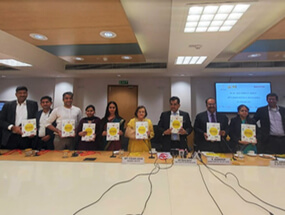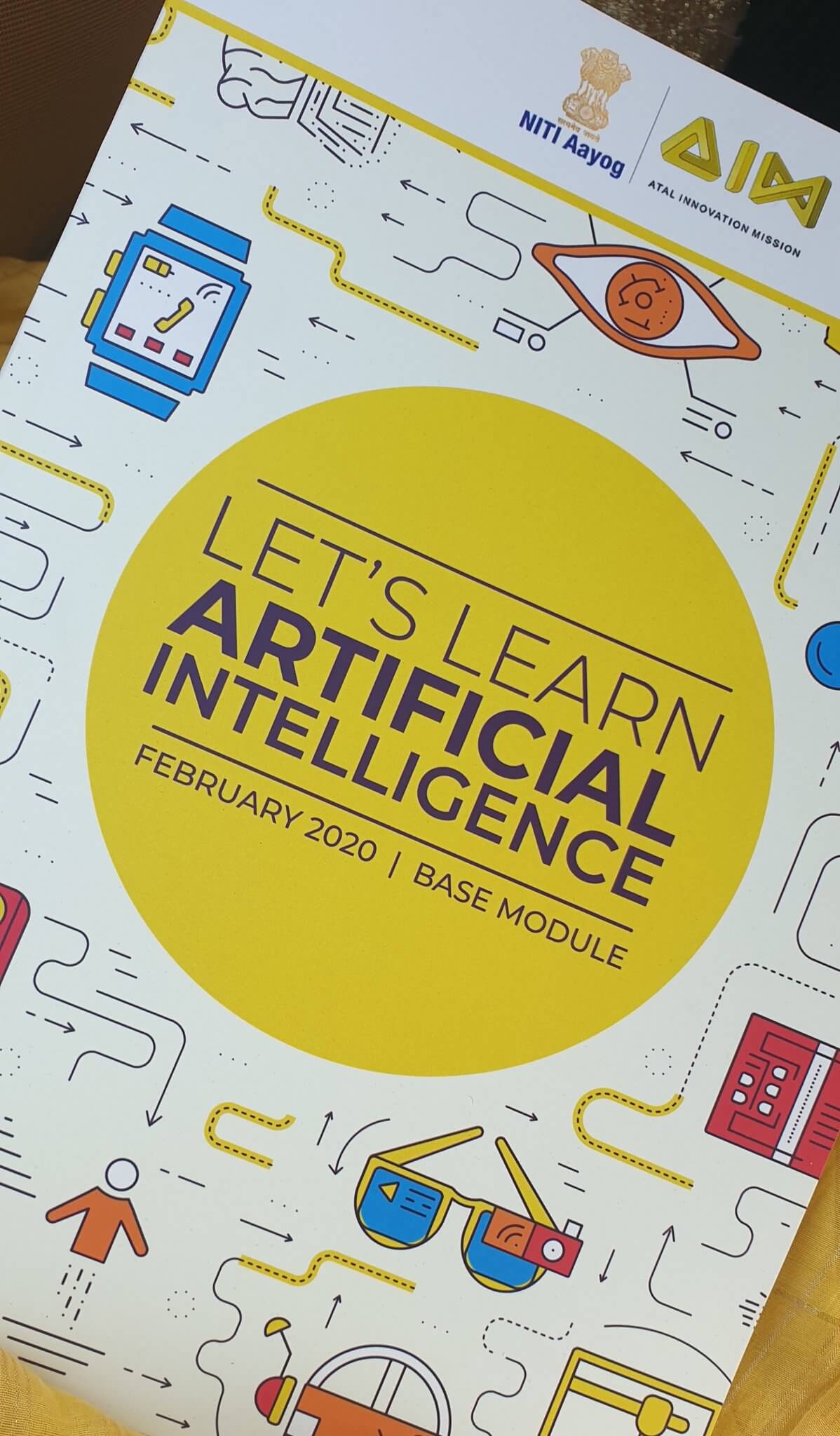Let’s Learn Artificial Intelligence -Base Module, Launched at Niti Aayog
PROGILENCE has worked with NASSCOM, and its convened industry workgroup to produce a first of its kind Let’s Learn Artificial Intelligence – Base Module for Indian schools’ children as part of the Atal Tinkering Labs intervention in Schools of India. The Mod ule Workbook was launched by dignitaries including CEO Niti Aayog Mr Amitabh Kant, President NASSCOM Ms. Debjani Ghosh, and Atal Innovation Mission Director, Mr. R. Ramanan. The Module was launched at Niti Aayog’s office in New Delhi, India on 27th February, a day before National Science Day, with a large contingent of media present. Also present were PROGILENCE Directors, S Manish Singh and Ms. Jassi Dimple, and various industry representatives that were part of the workgroup especially created to support the creation of this Module. The Base Module is introductory and has been kept simple for young school children to understand and begin engagement with AI demos and applications. It can be accessed on the AIM site here.
ule Workbook was launched by dignitaries including CEO Niti Aayog Mr Amitabh Kant, President NASSCOM Ms. Debjani Ghosh, and Atal Innovation Mission Director, Mr. R. Ramanan. The Module was launched at Niti Aayog’s office in New Delhi, India on 27th February, a day before National Science Day, with a large contingent of media present. Also present were PROGILENCE Directors, S Manish Singh and Ms. Jassi Dimple, and various industry representatives that were part of the workgroup especially created to support the creation of this Module. The Base Module is introductory and has been kept simple for young school children to understand and begin engagement with AI demos and applications. It can be accessed on the AIM site here.
The Module will be followed up by a more advanced Step-Up Module that will be more in alignment for students of classes 9th – 12th for developing practical skills and further advanced concepts in AI. The Module includes various videos, activities and concepts articulated for introducing Artificial Intelligence to young students. The development of the Module takes into consideration the contextual realities of Indian Schools and the framework of Atal Tinkering Labs or ATLs. The Atal Innovation Mission has introduced ATLs as a co-curricular facility for transacting modern technology courses that allow for practical tinkering to develop hands-on skills and innovative mindsets among students. These aim at enabling the development of practical application integrated with the community and contextual needs from a school-going age. There are about 5000 ATLs currently operational and expected to more than double over the next year. The Module is expected to reach over 2.5 million students.
Several ATLs, school children, coordinators and teachers were spoken to as part of the contextual research that went into developing the course module. The variation, usage patterns, key challenges and opportunities were understood by the PROGILENCE team before the philosophy and considerations for course development were finalised. As per S Manish Singh, MD PROGILENCE, “Contextual alignment is key, even though the ultimate model of standardisation is desired by many for ease of execution and evenness of outcomes. Yet, for broad-based programmes to be successful, we need to ensure that an effective strategy addresses the user segment variation since we are not controlling input levels. Therefore, introducing planned variation was a key tenet aimed at engaging a broader set of students than what we saw was already happening. We hope that through closely monitoring the pilot, we can get further alignment towards these objectives”.
“The idea is to then enable intelligent scaffolding for developing real skills in a few related technology areas. This is the true integration of Technical and Vocational Education and Training (TVET) and School education, the true aim of Skills Development interventions. Of course, implementation is key beyond this stage”, he added.
The Module includes inputs on introductory AI and Machine Learning concepts, along with relating maths, data, algorithms, problem solving and ethics in AI. The developers also felt the need to include options for introducing programming by recommending engagement with Scratch and Python.
“Given the on-ground conditions, it was important to integrate computer science basics and coding basics into the Module. The need was felt due to lack of standardisation in teaching CS and Coding in schools; though some schools we interacted with did offer these. We had to ensure the students had some concepts clear and skills developed, to prepare them for further engagement, else missing rungs may limit meaningful scaffolding and thus, impact progress negatively”, said Manish.
The industry workgroup that supported the initiative includes companies such as Adobe, Amazon, Bosch, SAP Labs, Wipro, Tech Mahindra, NVIDIA, Unity, XCEL Corp, of course, helmed by NASSCOM under their FutureSkills program.





